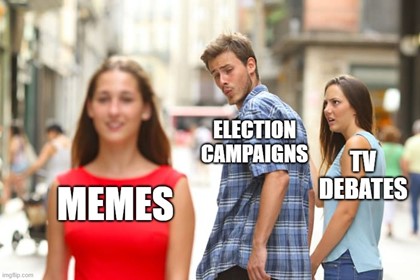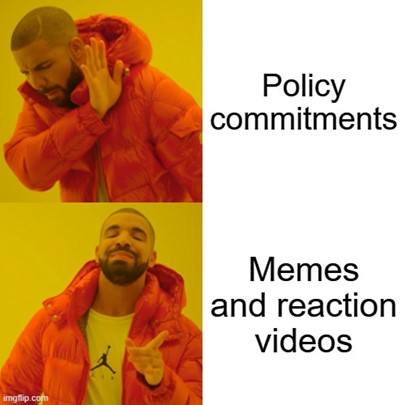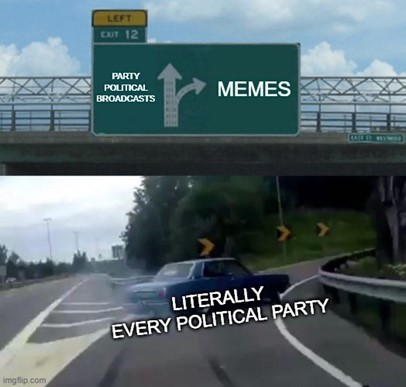
It’s probably too early to properly define the narrative of the current General Election; we’ll need a few more milkshakes for it to properly be “the milkshake election”. Our view is that 2024 is already shaping up to be the “meme election”.
Memes work because they deliver a message with humour and relatability, often at a hyper-local or community level. This is a key consideration for comms teams looking to move beyond traditional political and policy chat and reach broader audiences.
But how effective is this strategy? Does online talkability convert into votes? We’ve picked out three key considerations based on what we’ve seen so far.

Joking to the converted?
Social media is once again a key election battleground – unsurprising given how much time we spend on the big platforms, and how much of our news we read there. Social is seen as particularly important for reaching younger audiences who are much less likely to consume mainstream media.
However, these voters are in fact the least likely to be undecided (8% of 18-24 year olds versus 16% of 45-54 year olds), and according to the latest Survation polling, the majority of under 35s are planning to back Labour at this stage.
The Conservatives and Liberal Democrats therefore have a lot to gain taking the meme-route to social media campaigning. You could question whether this same approach will provide much benefit to Labour, who will be speaking to a demographic amongst which they already have overwhelming support. However, with Labour’s internal mantra being to avoid complacency, and concerns that young people aren’t as engaged with Starmer’s Labour, they might see it as an important way of shoring up the young vote.
So, how are memes being used (and how are audiences responding to them)?
Labour appears to have given its social media team free reign to make memes disparaging the Tories, which are broadly landing well with Gen Z on social. It’s clearly getting to the Conservative Party, which Labour claims has been working to get popular posts removed. Unsurprisingly, pop-culture references feature among Labour’s best-performing content – including the likes of 80s TV show ‘Surprise Surprise’ and the ‘is this a pigeon?’ meme. It’s worth saying that they don’t get everything right – the “footballer National Service POV” video was comparatively poorly received by users who felt it was out of touch with the average voter. The party is receiving more negative feedback from users on other platforms, such as X, where users are “begging” for more serious content.

In contrast, the Conservative approach to memes remains just that (small ‘c’ conservative). Opting away from short-form vertical video but instead pushing humour-led content on Facebook, Instagram and LinkedIn. The Tory ‘hero’ content was “Every Colour of Keir” – a jab at Sir Keir’s perceived lack of commitment to policy. Of course, how people respond across platforms reflects who is actually on these platforms. Where LinkedIn users immediately asked the Conservative party to keep politics off the professional platform, Facebook users have been more receptive.
The Lib Dems have opted for a different approach altogether, using self-deprecation to laugh at their own leader and bringing more attention to Ed Davey’s photo-ops, showing that there might be space to have a sense of humour in this year’s general election. It makes their mockery of Sunak, with the help of a soundbite from Peep Show, seem much better-natured and helped them on the way to over 1.3m views.
Natty Serv: Tory rage bait?
Are the Tories using the national service policy as a way to get people to engage with the election? Say what you want about the policy, it got people talking. In fact, it prompted 539,000 mentions on Reddit and X in the past week as people took to social media to air frustrations, question Tory rationale and naturally, engage with memes.
The Conservatives are trying to exploit wedge issues for the Labour Party at the same time as showing that their voters shouldn’t go with Reform. They may view controversial announcements as a way of taking attention away from their opponents, taking a page out of the online troll playbook. With Sunak’s digitally savvy team, who helped to establish ‘brand Rishi’ in the first place, it’s hard not to think that they are aware of the online splash that unconventional policies will cause. Farage’s entry into the fray will only encourage them to redouble their efforts, and we shouldn’t expect this to be the last announcement that surprises the public, nor the last one that the Conservatives invest in promoting on social media.
What can we learn from this?
Now that the parties have kicked off their meme strategies, we shouldn’t expect them to stop. You should be prepared to laugh, groan, and despair at their output over the next four weeks, potentially all in the span of one doom scroll, but there are also some key things we can learn.
For anyone envying Labour’s output on social and wanting to replicate it, the clear lesson is that its social media team has been given freedom to operate quickly, jumping on trends and responding to opposition. This trust in a social media team is essential, and any future viral success will rely on this quick thinking (particularly as the novelty of memes being posted by a political party wear off).
The second key takeaway is that there’s a time and a place for everything. As we’ve shown, opinion is divided on whether humorous takes from a party that wants to govern are appropriate, and businesses will have to be even more careful. We’re almost certainly going to see a corporate social media account issue an apology for its failed attempt to join in with a political joke before the election is up, so make sure your organisation isn’t trying to jump in on trends that don’t fit with your tone of voice or purpose.
Parties still have some work to do to find the balance between the more serious policy-led posts, and the more playful content that is grabbing attention across ideological divides. Will any of these social media efforts spell success? While we can’t predict the future, it’s fair to say that memes are inspiring engagement from across the generations, and no party will take that for granted in a competition for attention.
Headland has partnered with LabourList, one of the leading authorities on the Labour Party to launch the first UK constituency map of Labour’s General Election candidates. View the map here.
Read more Insights & News

